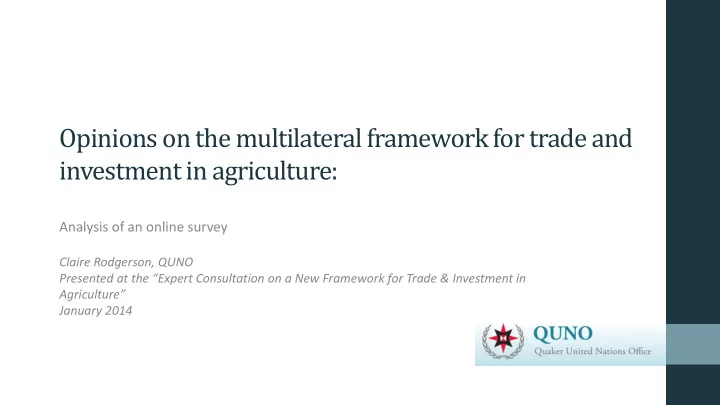

Opinions on the multilateral framework for trade and investment in agriculture: Analysis of an online survey Claire Rodgerson, QUNO Presented at the “Expert Consultation on a New Framework for Trade & Investment in Agriculture” January 2014
Background to the survey • Who the international governance system should work for • How it should work • Which institutions should be involved • October – November 2013 (pre-Bali ministerial) • Responses from individuals within NGOs, academia, social movements, UN bodies, the WTO and government delegations
Six questions • The main issues that rules for trade in agriculture need to address • The main issues that rules for investment in agriculture need to address • The main obstacles to addressing these issues • The most promising approach to resolving the obstacles • Is the current multilateral framework adequate ? Why? • What steps to take to effect the change needed
The main issues that international rules for trade in agriculture need to address today “There remains a pressing global problem – of chronic hunger and malnutrition imposed unnecessarily on hundreds of millions. To reduce this outrage promptly and significantly must then be the overriding objective addressed by trade, investment or any other interventions.”
The main issues that international rules for trade in agriculture need to address today • Greater state flexibility - To address price volatility (e.g. via public food stocks) - To regulate against cheap imports - To subsidise particular sectors (e.g. small scale farmers) • Inequality • Prices • Environment
The main issues that international rules for investment in agriculture need to address today • Tenure • Inclusion of voices of food producers, civil society • Environment • Type of production • Foundation of good governance
The main obstacles to addressing the issues raised “(It’s) tempting to say, money, money, money” • Inequality -within the WTO -between states -corporate power vs state • Value systems • Limited mandate of WTO • Increase in bi / plurilateral agreements • Misguided belief amongst “investors and agricultural experts that one solution meets the needs of all situations and all peoples”
The most promising approaches suggested to address the obstacles • Governance as a strong foundation • Coordinated international mandates • Inclusion of voices from food producers and civil society • Discernment over who rules should benefit “Some sort of fresh start…?”
Is the current multilateral framework adequate? “It cannot be working when so many people in the word are living on so little” “The current system is part of the problem not the solution and is responsible for creating much of the inequality between peoples and nations”
What steps are needed to effect the changes needed? • Giving more scope to other institutions (e.g. CFS) • Giving more weight to other agreements (e.g. Voluntary Guidelines and UN Guiding Principles) “Either the WTO goes through drastic change or trade and investment in agriculture should be taken up by another ‘champion’” • Changes within the WTO • Focus on livelihoods and environment
“A new economic framework has to be negotiated, that rebalances local economies at the expense of corporate profit made from unfair global trade.”
Recommend
More recommend